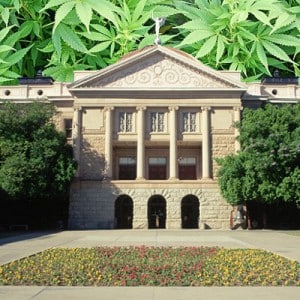 When It Comes To Medical Marijuana And PTSD Many Politicians Want To Stick Their Head In The Ground And Deny Reality
When It Comes To Medical Marijuana And PTSD Many Politicians Want To Stick Their Head In The Ground And Deny Reality
When you read marijuana news every day for a living, you begin to notice disturbing trends in the sensationalism used to cover the issue. Take this most recent example for the state of Arizona, where patient advocates are trying to get the state to recognize PTSD, anxiety, depression, and migraine as qualifying conditions for legal medical marijuana use.
First we start with the misleading headline, “Medical benefits of marijuana in dispute”. Ah, so someone has uncovered some research to show medical marijuana doesn’t really work, eh? Your curiosity piqued, you continue to the lede paragraph:
TUCSON, Ariz. – A new University of Arizona study shows little or no evidence that medical marijuana is an effective treatment for anxiety, migraines, depression and post-traumatic stress disorder, a finding that could hinder efforts to expand the allowable uses for the drug in this state.
Wait a minute, that’s not evidence medical marijuana doesn’t work. That’s lack of evidence to show it does work. Huge difference, don’t you think? If you walk me into a red room with a blindfold on, I will have no evidence as to the color of the room, but that won’t make the room any less red, will it?
The researchers, working on behalf of the state Department of Health Services that oversees the state’s medical-marijuana program, reviewed dozens of scientific studies related to marijuana use for the four medical conditions and determined that most of the research was of little value in weighing the medicinal risks and benefits.
So it isn’t that the “medical benefits of marijuana [are] in dispute”, it is that the quality of research is in dispute. And we all know why there is a dearth of legitimate research into the medical efficacy of cannabis for PTSD, anxiety, depression, and migraine.
Arizona health officials and medical-marijuana advocates agree the lack of scientific research is in large part because of restrictions on research of some controlled substances.
This, of course, works out perfectly for Arizona Gov. Jan Brewer and State Program Director Will Humble. They have long opposed the medical marijuana program and would rather open their border to Mexico than expand the list of conditions for which sick people could avoid being imprisoned for their medicine. Humble points out that the program serving 31,000 patients would add another 15,000 more if PTSD alone were added. Oh no! Sheriff Joe Arpaio and other cops won’t be able to harass, arrest, and imprison thousands of Iraq & Afghanistan and Vietnam Vets and victims of trauma they catch with a joint! Humble even tries to paint himself as the rational, neutral bureaucrat on the issue:
“The key question for us is: Do the benefits outweigh the risks?” said Will Humble, state health director. “And there’s just not that much research in this area to help form our policy decisions.”
“My goal is not to add things or not add things,” he said. “It’s to look at evidence and make a responsible decision.”
So the standard here will be that marijuana is dangerous and even though Arizona is allowing it for cancer, AIDS, and MS patients, there may be some risk in giving it to people with PTSD, anxiety, depression, or migraine? Marijuana — the drug so dangerous we can only give it to the frailest patients!
You’d think Arizona could just look across its borders to California and New Mexico. Both states have allowed the use of medical cannabis to treat PTSD for years now, and to the best of my recollection, I’ve heard no tales of terrible consequences for the veterans and trauma victims who used it. California famously allows for cannabis use for “any other illness for which marijuana provides relief”, including anxiety, depression, and migraine. Yet we’ve seen no wave of adverse reactions from these patients, no overdose deaths.
Yes, marijuana, that benign herb with a 5,000 year history of medical use, the drug a DEA Administrative Law Judge declared two-dozen years ago to be “the safest therapeutically active substance known to man,” that’s the one Will Humble must apply a strict risk/benefit analysis to. Meanwhile, thousands of Arizonans will be taking FDA-approved drugs like Carbamazepine (Carbatrol, Equetro, Tegretol, Tegretol XR), Felbamate (Felbatol), Gabapentin (Neurontin), Lamotrigine (Lamictal), Levetiracetam (Keppra), Oxcarbazepine (Trileptal), Pregabalin (Lyrica), Tiagabine (Gabitril), Topiramate (Topamax), Valproate (Depakote, Depakote ER, Depakene, Depacon), and Zonisamide (Zonegran)1 for treatment of their anxiety, depression or migraine headaches. These drugs have been shown in placebo-controlled scientific studies to double the risk of suicidal thoughts and behavior, yet the FDA didn’t even recall them, they merely added a warning to the label that taking these drugs might make you suicidal.
So, really, Will Humble, you need some more evidence that depressed people can safely use cannabis, until then, they have to take the pills that make them more suicidal?
FOOTNOTES
1. The next time someone makes fun “Alaskan Thunderfuck” and other strains as names for medicine, just read this list of drugs to them. It’s like a Scrabble bag loaded with extra X’s and Z’s just exploded. At least I can spell and pronounce “thunderfuck”!
This article was published with special permission from the National Cannabis Coalition







